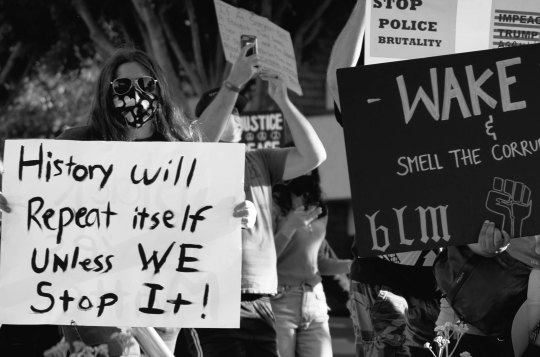You Can’t Stop Fascism by Limiting Basic Rights: Our Stance
Expanding the reach of the white supremacist police state and taking away our rights undermines our democracy.

Image by Joshua Koblin: A black lives matter protester holding a sign that says “History will repeat Itself unless we stop it!”
How the US acts in response to crisis sets precedents that we live with well beyond the moment. Fear during a crisis often compels rapid, ill-advised action. Many of the worst tools used by those who seek to undermine our democracy were born in the aftermath of 9/11, with the hasty consent of Congress.
Crisis is a test of us as a country—and historically we have failed. We are now on the cusp of a slower-moving, but no less dire crisis than the Capitol riot: the crisis of squandering momentum in shortsighted action.
In the coming weeks, we fully expect that Democrats and Republicans will demand more surveillance, more powers for police and FBI, and more government-mandated censorship of our public discourse online. They will do this out of the misguided belief that dismantling the mechanisms of protest, speech, and resistance in this country will make us safer. Unfortunately, these oppressive, authoritarian actions disproportionately endanger the wrong people—those fighting for racial equity, clean water, and a sustainable future.
Censorship always silences marginalized voices first, whether the legislation is SOPA/PIPA, SESTA/FOSTA, or the repeal of Section 230. Surveillance always criminalizes Black, brown, Muslim, and LGBTQ+ dissent the most—and funding expanded surveillance leads to universally harmful technologies like facial recognition or the bulk data collection revealed by Edward Snowden. Expanded policing deepens the systemic injustice that plagues this nation, devouring resources desperately needed for community development and advancement.
White supremacists like those who took the Capitol are not a new phenomenon for the communities most impacted, although they may be seen as new by white people who suffer fewer of their effects. White supremacists have employed violent tactics throughout the history of this country with the intent of disrupting democracy and denying equal representation to communities of color. The disruption we are experiencing is a symptom of a larger ill. The systemic empowerment and validation of white supremacy and supremacists is what has led to centuries of racial and economic violence, conditions under which democracy simply cannot thrive.
Attacking the right to protest and the right of free speech is what democrats and republicans will knee-jerk to in the coming days. What they should attack instead are our failed institutions that are grounded in white supremacy.
White supremacy deals in economies of artificial scarcity to divide people. It insists that there are not enough human rights to go around. Artificial scarcity is at the heart of Capitol rioters’ choice to “take care of their own” by blaming other everyday people for their suffering. White supremacy displaces victimization onto the most powerful in a community, granting them permission to defend and perpetuate unbearable economic violence.
Our electoral system is a white supremacist system. Our criminal/judicial system is another. A third is surveillance capitalism. All those who point out that there is something wrong with the amplification of hate on the internet are correct—but individual speech isn’t the problem. Calls for censorship are little more than victim-blaming in a surveillance capitalist system where the economic violence is extracting views and clicks from humans with algorithms that prioritize hateful messages.
The scarcity of electoral resources is artificial. The scarcity of justice is artificial. The scarcity of space online to grow the goodness of humanity is artificial. All of these artificial scarcities are a traditional hallmark of a white supremacist institution.
And the impacts of white supremacy-fueled culture war on our democracy, on our public discourse, on justice and on our human rights, will all only get worse until we address the root cause of this artificial scarcity. We have to reimagine these institutions, and doing so can only happen on a foundation that centers the basic rights and needs of people.
So we call on democrats, who now have a mandate for reform and no excuses across all three branches of government: start with what people need, and rebuild institutions from there. Reform the internet, starting with rights to access, privacy, and free speech. Reform the electoral system, starting with the right to equal representation. Reform the judicial system, starting with the right to justice.
Don’t take away rights out of fear. Fear is how this moment happened in the first place.

